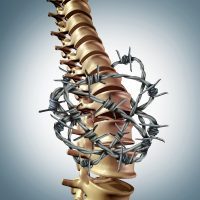When the truth hurts
Here’s something that almost never happens: You ask someone, “How are you?” And they respond with this: “I’m in so much pain I don’t know what to do.”
But sometimes, that’s the unspoken answer. Those in pain don’t often say it because they know most people wouldn’t know what to do with that uncomfortable truth. So, instead, they follow the script and hit a more pleasant ball back over the conversation net. “I’m okay. How are you?”
But they’re not okay, and the people who love them and witness their day-to-day pain aren’t okay either.
I’ve been thinking about physical pain for months now. Not because I’m in it. Gratefully, I’m not. But I’ve seen it up close. I’ve seen its power. And it feels wrong not to write about something that changes so many lives.
Back in March, my mom (who is 79 and working full-time) suddenly began having back pain – a piercing sensation in the center of her back. At the time, we thought it was a side effect of chemotherapy. When you have cancer, you assume everything is connected to it. But when the pain continued and worsened, Mom’s oncologist ordered an x-ray that revealed a spinal compression fracture.
As an adult daughter and certified nerd, I manage stress by Googling every aspect of whatever keeps me up at night. I even read obscure medical studies written in such confusing academic jargon that I have to stop and look up every third word. Information is my security blanket. More than anything, I need to understand and find an answer.
What I learned is that some people with a spinal compression fracture don’t even feel it. But others feel an invisible hand plunging a knife into their back again and again. Movement can trigger misery, even a tiny bump during a slow, careful car ride.
I could almost see my mom’s pain move in real time because when it hit her, she flinched so hard it looked like she’d been hit by a stun gun. Pain can make even the most silent and stoic among us cry out or scream. It can turn a typically sunny personality into something unrecognizable. It can most certainly open the door to depression.
I tried so hard to make her pain stop. Bedrest. Numbing creams. Pain patches. Doctor appointments. Prescriptions. Some of it helped initially, but the pain  always found its way back. Then it accelerated into a series of daily back spasms, and I watched Mom get tortured from inside her own body. I could see her agony and the fear that it might not end. She would’ve crawled out of her own skin if she could. I sat beside her and promised it would end soon, even though I didn’t know if it would. I silently pleaded with God and every person in Heaven for help.
always found its way back. Then it accelerated into a series of daily back spasms, and I watched Mom get tortured from inside her own body. I could see her agony and the fear that it might not end. She would’ve crawled out of her own skin if she could. I sat beside her and promised it would end soon, even though I didn’t know if it would. I silently pleaded with God and every person in Heaven for help.
During these moments, I realized I could do plenty of things for my mom – make her food, bring her medicine, clean her house, and talk to her doctors. But I couldn’t stop the pain. At that all-important task, I failed every single day.
Pain can make you question everything. Am I just unlucky? Cursed? Broken? Is this punishment? Why aren’t the prayers working? Why her? Why us? What’s the point of this? When will it stop? What will we do if it doesn’t? The shame of silent questions feels suffocating.
After weeks of waiting for an appointment, I drove Mom three hours to a specialist who stabilized the fractured vertebra with a procedure using “bone cement.” It didn’t work instantly, but slowly, that overwhelming tide of pain began to recede. The relief felt miraculous and our gratitude immense.
But once you know what pain can do, you know. You can’t un-know it. And now I think about all the people in pain who are still waiting. Searching. Begging, both silently and otherwise, for help. None of us are immune from this experience.
Sometimes, obituaries include the phrase “thankful that he is no longer in pain.” Because grieving family members know that pain can get so big that it pushes everything else away, leaving only pain. They’ve seen it in ways they’ll never forget.
So maybe we should be more willing as a society to talk about pain — not because we want to but because there’s so much of it. And the people who somehow bear it need to have the pain acknowledged, not avoided or glossed over. They deserve the comfort of being seen even in their suffering.
For all those who are hurting today in unimaginable ways – and for the people who love them so dearly – may you find an answer, a cure, a treatment, and most importantly, relief. May it come in abundance so very soon. Until then, may you be surrounded by love and the compassionate balm of human connection.
Gwen Rockwood is a syndicated freelance columnist. Email her at gwenrockwood5@gmail.com. Her book is available on Amazon.
